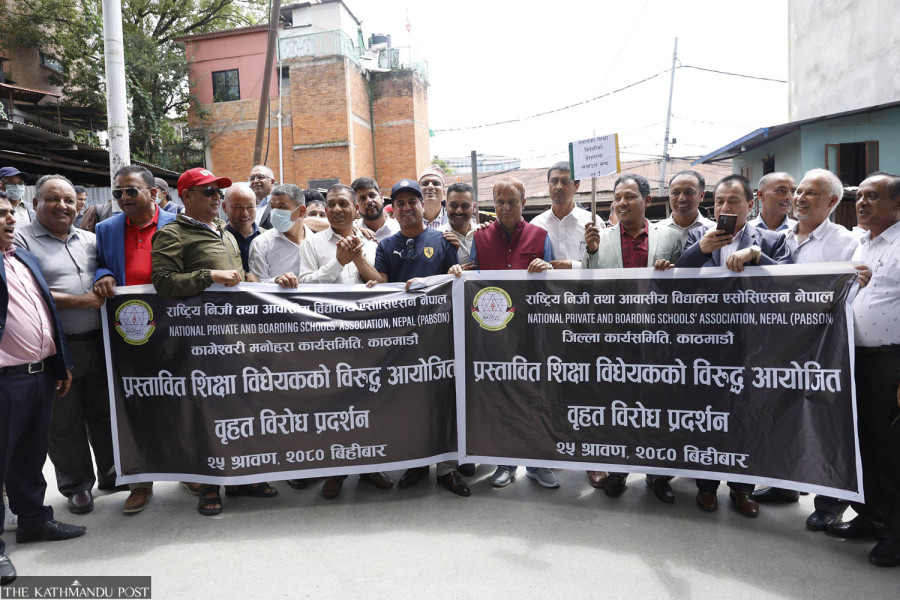National
Why a hue and cry over Education Bill?
Proposed rules aside, politicians are unlikely to go against interests of private schools that fund them, say experts.
Binod Ghimire
Nearly eight years after the promulgation of the Constitution of Nepal, the Cabinet on August 1 decided to register the Federal Education Bill in Parliament. A new Act is a must for full implementation of the Constitution of Nepal which delegates most of the responsibility to manage school education to the local level. However, the bill has been embroiled in controversy even before being registered in Parliament.
Following intense pressure from private school operators, the government has agreed to revise some of its provisions they have objected to, before it is registered in the House. Other stakeholders, too, oppose several provisions of the bill. Here’s why the bill met with criticism even before its endorsement by Parliament and how the issue may be settled.
Why the bill?
Nepal’s school sector is guided by the Education Act, formulated in 1972 during the Panchayat era. The 2015 statute envisioned a major oversight transfer of school education, from the federal to local governments. Schedule 8 of the constitution entrusts the respective local unit to manage school education up to grade 12 while Schedule 9 also lists education as a concurrent jurisdiction of the three tiers of government. In the absence of a law, there is a jurisdiction overlap between the different layers of administration. A new law is necessary to streamline the powers and also to realise the constitutional vision of a socialism-oriented order.
The constitution had set a deadline for revising or introducing new laws to implement fundamental rights and to amend the existing ones that contradict the constitutional spirit. As there is no deadline to pass the laws needed to execute federalism, successive governments have been delaying the bill.
Which provisions have courted controversy?
Private schools, also called institutional schools as opposed to government-funded ones, have been objecting to the provision proposed to convert them into trusts. Clause 4 (3) of the bill makes it mandatory to convert the private schools registered under the Company Act into trusts within five years. Officials say the provision was introduced to stop over-commercialisation of school education. The High Level Education Commission in 2019 had recommended converting private schools into trusts within 10 years. The report, prepared during the tenure of then-prime minister KP Sharma Oli, however, was never made public officially owing to a strong resistance by private school operators.
Private schools operators say the provision goes against the fundamental right to property and the directive principles of the constitution that recognise the private sector as a driver of the country’s economy. It says Nepal’s national economy will be enhanced through partnership and independent development of the public, private and cooperative sectors.
“We have invested in schools by selling our ancestral property and taking loans from banks,” said DK Dhungana, chairperson of the Private and Boarding Schools' Organisation Nepal. “Converting our private property into trusts is unacceptable.” He demanded that the schools be allowed to function under the existing arrangements.
Not just private school operators, local units and teachers’ associations, too, have objected to several other provisions in the bill. The umbrella body of rural municipalities has demanded the government remove the plan to revive the district education offices. The offices were scrapped with the Local Level Governance Act coming into effect following the promulgation of the new constitution. In addition, the school teachers have expressed strong dissatisfaction over the authority of the local governments to hire and transfer them. They want to work under the federal administration.
Why were private schools brought under the Company Act?
In 2001, in an attempt to bring private schools into the tax net, the Act was revised to register them as either trusts or companies. Most schools were registered as companies while some chose to operate as trusts. Except a few, all schools established with private investments came under the Company Act.
Dhungana said it was the government that pushed them to register as companies.
Members of the 2019 high-level commission say the provision for converting the schools into trusts was meant to stop the exploitation of teachers and school staff. “Most private schools are money-minded with the primary objective of earning profits, even by not paying their teachers and staff well. When schools become trusts, they cannot take profits home, which will ensure that the teachers and staff are paid well,” said Bidhya Nath Koirala, a member of the commission.
Conversion to trusts, however, does not bar investors from owning the property. It can also be transferred to the children of the owners just like ancestral property.
How will the bill fare?
At a function organised on Thursday, Prime Minister Pushpa Kamal Dahal said the government would register the bill only after revising some of its provisions. Though he didn’t specify the possible changes, the requirement of private schools to convert into trusts and the revival of the district education offices are likely to be struck off.
A day later, the government reached an agreement with the protesting private schools, agreeing to address their concerns. The agreement was witnessed by Deputy Prime Minister and Minister for Defence Purna Bahadur Khadka and Education Minister Ashok Rai.
Educationists say it was a given that the government would kneel before private school operators. Koirala said the political parties and their leaders cannot ignore private schools that are a source of their funds. Also, many leaders of political parties own private schools. Rai, the education minister, himself runs a private school at Buddhanagar in Kathmandu. “We cannot expect our political leadership to go against the interests of the private schools,” said Koirala.




 17.13°C Kathmandu
17.13°C Kathmandu














